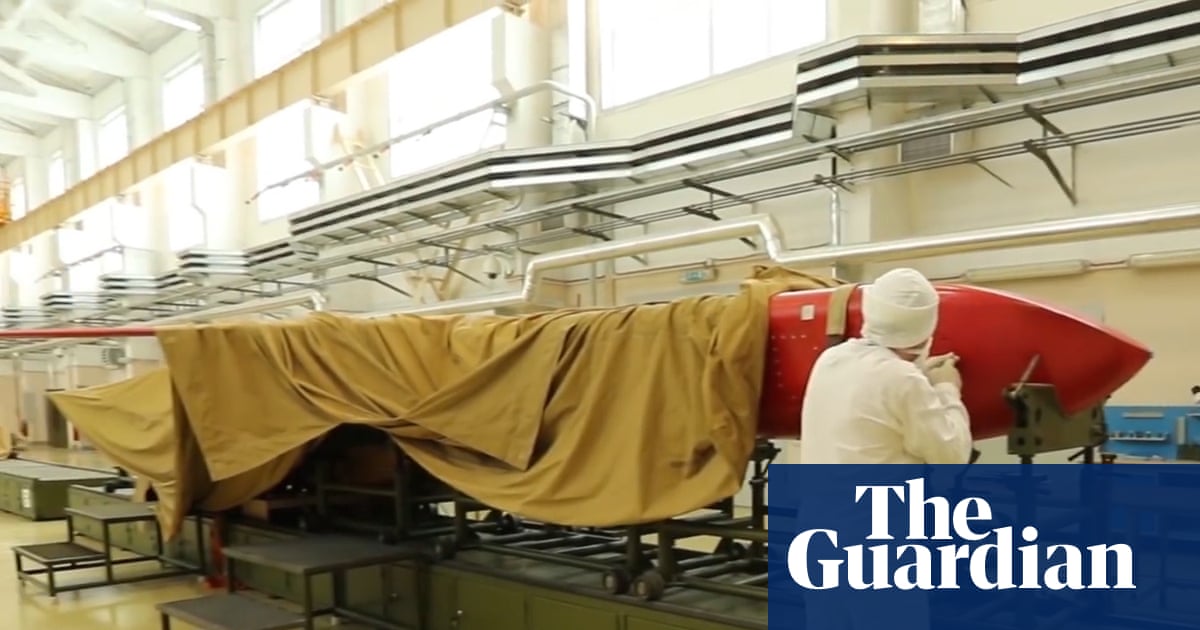Hermer says, if spy case had gone to trial, Badenoch’s quote saying China not a foe would have helped accused get off
Mark Sedwill, the former cabinet secretary and former national security adviser, goes next. He is now a peer, and a member of the committee.
He says the deputy national security adviser, Matthew Collins, thought there was enough evidence for the case to go ahead. But the CPS did not agree. Who was right?
Hermer says the jury would have to have been convinced that China was an enemy.
And the problem in this case was that the government was not neutral on whether China was an enemy. “The government’s position was that it was not,” he says.
He says, if the case had gone to court, the defence would have quoted ministers in office at the time saying China was not an enemy. He quotes examples of James Cleverly, the former foreign secretary, and Kemi Badenoch, the former business secretary who is now Tory leader, as saying that.
Badenoch said, when she was in cabinet, that China should not be called a foe.
Key events
-
Hermer rejects claim from former Labour defence secretary Lord Hutton that government complacent about China threat
-
Statistics watchdog reprimands Steve Reed for saying water pollution worse in Scotland than in Wales
-
Cabinet Office minister Darren Jones ducks question about whether China should be in enhanced tier for Firs rules
-
Hermer accuses Gavin Williamson of making bogus allegations against Jonathan Powell, underming faith in justice system
-
Counting in 2026 Scottish parliamentary elections will start on Friday morning, not overnight, officials announce
-
Hermer says claims that ministers intervened in China spy case ‘disgraceful’, in attack on senior Tories
-
Hermer says prosecution could have gone ahead under NSA, even though China not in enhanced tier under Firs rules
-
Hermer says, if spy case had gone to trial, Badenoch’s quote saying China not a foe would have helped accused get off
-
Hermer says China spy prosecutions would have gone ahead if National Security Act had been passed ealier
-
Lord Hermer says, once China prosecution originally approved, attorney general had no further role in CPS decisions
-
Lord Hermer, attorney general, gives evidence to committee on China spy case
-
Government suffers 5 defeats in Lords as ‘ping pong’ starts over employment rights bill
-
Boris Johnson approved China’s London super-embassy proposal in 2018
-
Shabana Mahmood says Home Office not ready for all challenges, as it says illegal working arrests at record level
Hermer rejects claim from former Labour defence secretary Lord Hutton that government complacent about China threat
Lord Hutton, a Labour peer and former defence secretary, says the joint committee has not heard any evidence that politicians interferred with the CPS decisions in this case.
But he says he is worried about “complacency” in government. He says he is worried that the “inherent reticence on the part of government to really call out the dangerous nature of Chinese espionage activity” could lead to other alleged spies not being prosecuted in future.
Hermer disputes this. He says the new legislation will make it possible to prosecute allege spies. He goes on:
We now have legislation that is fit for purpose, and we will use that legislation whenever there’s credible evidence that people are seeking to damage the national interest of this country.
Back at the joint committee on the national security strategy hearing, Darren Jones, the Cabinet Office minister, says the Tory claim that ministers interferred in this case was a “grave” one. It was not true, he says.
He says the Tories than alleged that ministers should have got involved.
But “that’s not how we do things in this country”, he says. He says the CPS is independent, as it should be.
Statistics watchdog reprimands Steve Reed for saying water pollution worse in Scotland than in Wales

Helena Horton
Helena Horton is a Guardian environment reporter.
Steve Reed, the housing secretary, has been slapped down by the UK Statistics Authority for falsely claiming that Scottish rivers and lakes are more polluted than those in England.
Reed made these comments this summer when he was environment secretary in order to demonstrate that a nationalised water sector would not necessarily deliver cleaner waterways. Scotland’s water is nationalised; England’s isn’t.
These claims were obviously false; Scotland has a much lower population density than England and many remote lakes and rivers which are not near town centres.
Prof Dame Carol Propper, chair of the UKSA’s regulation committee, said in a letter to the SNP Seamus Logan:
The authority expects that ministers take care to avoid using data that is overly selective or missing appropriate context. Based on the statements made without discussion of their context, sources, and limitations, there is the potential for people to be misled about English and Scottish water quality and infrastructure.
She added that the evidence Reed used to back up his claims such as that Scottish households have a lower take up of smart water meters (which is about water use rather than pollution) were not relevant and that he did not share any information which proved his comments to be true.
His comments were derided as false by many commentators at the time. If you look at the metrics of pollution levels, Scotland’s rivers and lakes are doing better than England’s. Well over half of Scotland’s are in high or good condition vs 16% in England (with none of those being high).
Reed at the time said “pollution levels in Scotland are worse than they are in England” and the civil servants at Defra said that claims to the contrary were “absolute rubbish”.
Cabinet Office minister Darren Jones ducks question about whether China should be in enhanced tier for Firs rules
Edward Morello, a Lib Dem MP, is asking the questions now.
Q: Shouldn’t China be in the enhanced tier for the Firs scheme?
Darren Jones, the Cabinet Office minister, is replying. He says Hermer said earlier that China would not have to be in the enhanced tier for a spy prosecution to be considered.
Q: But shouldn’t China be in that tier anyway?
Jones says the Firs legislation has only recently come into force. What to do about China is being considered, he says. He says the government is dealing with this in the proper way.
Hermer accuses Gavin Williamson of making bogus allegations against Jonathan Powell, underming faith in justice system
Gavin Williamson, the former Tory defence secretary, is asking the questions now. He asks how common it is for officials to hold a meeting to discuss a CPS prosecution, as happened in this case.
Hermer says he has never been in a meeting of that kind where details of a prosecution were discussed, and he would never expect to be in a meeting of that kind.
Willamson asks the question again. He is referring to the meeting that took place on 1 September, convened by Jonathan Powell, the national security adviser.
Hermer says No 10 would never hold a meeting to discuss evidence in a forthcoming prosecution.
He says the meeting Williamson is referring to was to discuss the fallout from a trial that, at that point, everyone expected would go ahead.
He goes on:
Trying to insinuate bad faith into our national security [decision making] does nothing, nothing, to increase public confidence in it.
He says trying to undermine faith in the national security process, and in the criminal justice system, in this manner is “dangerous”. And he suggests Williamson should know better, particularly as a privy counsellor.
Counting in 2026 Scottish parliamentary elections will start on Friday morning, not overnight, officials announce

Severin Carrell
Severin Carrell is the Guardian’s Scotland editor.
Holyrood candidates, election agents, politics junkies and party activists will be spared the sleep-deprived tension and drama of an overnight count after next May’s Scottish parliament elections.
The electoral management board for Scotland, which sets the rules for carrying out elections, has announced the count for next year’s vote will be conducted during the day on Friday 8 May, starting at 9am sharp.
Malcolm Burr, the board’s convenor and the chief executive of Comhairle nan Eilean Siar (Western Isles council), said that would reduce costs, improve the process and allow more voters to follow the results. He said:
Counting during the day allows the use of well-rested staff with quick access to more resources, people and support facilities. Our counts are always accurate but working in the day removes some risks, reduces costs and lets us declare the results when more people are engaged.
He noted that for logistical reasons due to the remoteness and distances involved covering Scotland’s islands and rural wards, some counts (particularly involving the Western Isles) only took place the day after an election.
Delaying the count until Friday also prolongs the agony for political leaders too, particularly Keir Starmer. The prime minister faces a fateful week: the Welsh, Scottish and English local government elections on 7 May all threaten to produce deeply damaging defeats for Labour.
The EMB’s bulletin also said they learnt lessons from last year’s snap general election, which coincided with Scotland’s school holidays, causing chaos for some people who had postal votes or needed quickly to get one.
The experience of the administration of the UK parliamentary general election in 2024, particularly the challenges around print and postal vote administration, has informed the development of these directions. They are further intended to anticipate risks and challenges that may arise.
Darren Jones, the Cabinet Office minister, is sitting alongside Hermer. But, whenever he has been asked a question, he has essentially said that he has nothing to add to evidence given by others.
Hermer says claims that ministers intervened in China spy case ‘disgraceful’, in attack on senior Tories
Paul Boateng, the Labour peer and a former cabinet minister, goes next.
Q: Did you ever put it to the CPS that dropping the case would undermine public confidence in the justice system?
Hermer says it was not his job to overrule the CPS.
But he says no one would have left the meeting where was told that the case was being dropped without being aware of how disappointed he was about this.
He says he is concerned about the impact this case has had on faith in the justice system. But he says those who have made “baseless accusations” are to blame.
It’s also why I deprecate some of the baseless accusations that were levelled against the prime minister and against our national security adviser, [Jonathan] Powell, when this information, the decision of the prosecution was announced, that seeks to suggest that politicians had somehow improperly interfered in this case to stop the prosecution.
Effectively, allegations that they were perverting the course of justice against the national security interests of this country – now, those were disgraceful allegations to make without evidence. They were baseless, as the evidence of the DPP and the cabinet secretary have made plain.
Hermer does not name the people responsible for these “baseless accusations”, but he is referring to the Conservative party. Kemi Badenoch have repeatedly suggested that ministers and officials intervened to stop this prosecution going ahead, implying they leant on the CPS and withheld key evidence.
Hermer says prosecution could have gone ahead under NSA, even though China not in enhanced tier under Firs rules
Emily Thornberry, the Labour chair of the foreign affairs committee (and a barrister), goes next.
Q: The CPS has revealed that the word enemy was in the original draft of the first witness statement from the DNSA, but not the final version. Shouldn’t that have flagged up a problem?
Hermer says the real problem was the gap between the statutory test of enemy in the Official Secrets Act, and government policy at the time.
Thornberry suggests that, given the extent of the evidence showing China does pose a threat, it would have been better to have put this to a jury.
Hermer says this discussion shows the Official Secrets Act “was not fit for purpose”. He says if the National Security Act the prosecution would have gone ahead, “I’ve absolutely no doubt about it”.
Someone (it is not clear who) puts it Hermer that, because China is not in the enhanced tier under Firs (the foreign influence registration scheme – a system requiring agents for foreign powers to register, with tighter requirments for hostile countries in the enhanced tier), even under the National Security Act it would have been hard to show that spying for China was illegal.
Hermer says he does not think that would have been an issue. China would have counted under the foreign powers provision, he says.
Sarah Champion, the Labour chair of the international development committee, asks if the CPS could have brought other charges.
Hermer says those are really questions for the CPS. Prosecutors normally bring the strongest charges.
Q: Is it unusual not to have a backup plan for charges that could be brought?
It depends on the case, Hermer says.
Mike Martin (Lib Dem) goes next. He asks if it would have been better to get, say, a former head of MI5 or MI6 to give evidence about China being a national security threat, not the deputy national security adviser.
Hermer says he thinks Matthew Collins, the deputy national security adviser (DNSA), was an appropriate witness.


